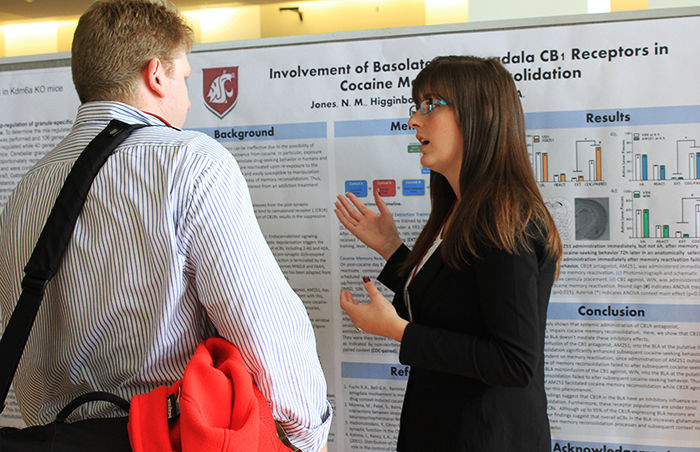Research should be an option for the Junior Writing Portfolio
Krysta Dawson presents her research on extracting health effects of exposure to oil at SURCA on March 28, 2016 in the CUB Senior Ballroom.
June 28, 2017
With a new administrative president at WSU came a worthwhile ambition. Kirk Schulz introduced the “Drive to 25,” which propels our beloved school to become a top-25 public research university by 2030. If our aspirations are sincere, then it is imperative that students are able to fulfill more of their graduation requirements through research at the undergraduate level.
Faculty and graduate students cannot pull the weight alone. Undergraduates must contribute to the “Drive to 25.” Enabling students to fulfill a key graduation requirement through a research option would set that into motion. The Junior Writing Portfolio is a current graduation requirement that asks students to record samples of their graded writings.
“We accept any writing that a student has done for any college course,” said Xyanthe Neider, coordinator of the writing assessment in the Writing Program. “This includes technical writing, lab reports, research papers, speeches, fiction, poetry, on paper written in a foreign language — any writing as long as it is at least one page and a half in length.”
Student participation matters. It’s the unfortunate truth that research often does not energize participation unless that opportunity can be used to fulfill other obligations. Out-of-class research is not graded, so it cannot be included in the Junior Writing Portfolio. Student graduation requirements could include a research option in the Junior Writing Portfolio to incentivize more active engagement in faculty-led, hands-on research.
WSU’s Office of Undergraduate Education offers plenty of resources, but the university is relying on voluntary undergraduate research engagement without significant incentive for many students to partake in it.
A research option for the Junior Writing Portfolio requirement would catapult undergraduate participation toward achieving the “Drive to 25.” The possibilities for this stipulation include participation in the Showcase for Undergraduate Research and Creative Activities (SURCA), assisting faculty with research or completing an independent research project.
Engaging with faculty-mentored research ignites a mutually-beneficial relationship by aiding faculty in their labors while pushing students into real-life research. Undergraduate assistance easily alleviates the time and cost of conducting research while trumpeting more funding from grants and donations.
The Office of Undergraduate Education reported 33 percent of WSU seniors in Pullman assist faculty mentors with their research. For context, that’s about 56 percent lower than the senior research participation at the University of California, Berkeley.
University of California, Los Angeles, another high-ranking public research university on the West Coast, is known for its student-run Undergraduate Science Journal, which spotlights original research articles and provides undergraduates with an in-depth experience of the scientific peer review process. Students in the liberal arts have historically used school newspapers to publish their English composition. An Undergraduate Science Journal engineers a publishing venue for Science, technology, engineering and mathematics (STEM) students that specialize in writing research.
The most formidable opportunity Cougs have to partake and exhibit undergraduate research is SURCA. The Office of Undergraduate Research proudly orchestrates the program as an annual symposium where students of all majors and campuses publicly display their faculty-mentored research.
Undergraduate research symposiums are common in universities throughout the nation. The discrepancy is mainly involvement. Last year, 225 Cougs participated in SURCA, according to the SURCA website. Less than 1 percent of WSU’s undergraduate population participated. About five times the number of students participated in UW’s research symposium. Both bridge connections between students and faculty, apply classroom lectures to real-world problems and contribute to actual research outcomes.
It’s through vitalizing our massively untapped undergraduate students that WSU can most rapidly accelerate our academic reputation in research for the “Drive to 25” initiative, encourage future prospects to choose the Cougar way, rally more financial endowment and guarantee the success of graduates into the job market.








